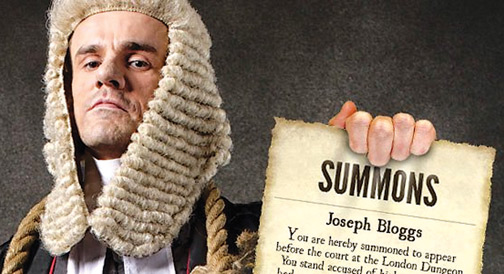Obey summons if not 'Mr. Warrant' will catch you
by Justice P.H.K. Kulatilaka
Being good citizens of Sri Lanka our main concern is to live in a
community where there is peace and good order. There should be ways and
means of safeguarding the freedom of the just man. Thus social security
becomes important.
The disturbing factor in this scenario is the crime doer. The laws of
the country will not allow the law abiding citizens to be preyed upon by
the perpetrators of crime.
Fundamental Rights
Our Constitution has in its wisdom grafted enshrined provisions into
Chapter III dealing with Fundamental Rights for the establishment of a
just and free society where people can live as' children of one mother'.
 Nevertheless even in utopian society humans by their nature are prone
to commission of crimes against their fellow humans and on the other
hand getting involved in civil disputes. In dealing with crimes the
State has an important role to play so as to provide social security to
its citizens. For this purpose it entrusts its police force with powers
to make use of their good office to prevent crime before it happens and
if it does happen to detect it, apprehend the perpetrator and bring him
before justice. Nevertheless even in utopian society humans by their nature are prone
to commission of crimes against their fellow humans and on the other
hand getting involved in civil disputes. In dealing with crimes the
State has an important role to play so as to provide social security to
its citizens. For this purpose it entrusts its police force with powers
to make use of their good office to prevent crime before it happens and
if it does happen to detect it, apprehend the perpetrator and bring him
before justice.
All the processes are supervised by the courts to see that the law
enforcement officers obey the rules of right conduct as required by the
Constitution and the Code of Criminal Procedure Act.
The writer will concentrate on the procedure governing crime only for
in respect of civil disputes the procedure is looked after to by their
counsel because each party to a dispute is expected to bring his own
witnesses and documents to court to establish his case on a balance of
probability.
Police
The police have a vital role to play in the preservation of a just
and free society. In England they are called 'the guardians of the
peace'.
To the Englishmen police are the friends of the people. The policemen
in Sri Lanka have a long way to go to get into the trust of the people.
From their childhood days the parents paint a wrong picture in their
children's minds as to who a policeman is. When a child misbehaves over
a slightest thing they scare the child by saying 'I am going to call the
police'. The child grows up with this mindset.
It is the bounden duty of every responsible citizen to support the
police and to recognise that they are the front line of defence against
violence and intimidation.
Duties of a police officer are enumerated in section 56 of the Police
Ordinance. It is his duty to use his best endeavours and ability to
prevent all crimes, offences and public nuisances to preserve the peace.
It is his duty to detect and bring offenders to justice. On the other
hand, the law requires him to promptly obey and execute all orders and
warrants issued and directed to him by any court.
Powers
Such powers of arrest are given to them by section 32 of the Code of
Criminal Procedure Act which specifies and enumerates the offences where
the police may arrest a person without a warrant. It also permits the
operation of any enactment empowering a police officer to arrest without
a warrant. In the statute book such offences are referred to as
cognizable offences and are commonly called arrestable offences. There
is the other group of offences where a policeman may not arrest without
a warrant. They are referred to as non cognizable offences.
Making an arrest
To prevent any abuse of power the legislature in its wisdom have
brought in section 23 of the Code of Criminal Procedure Act which lays
down the mode of making an arrest. Common Law in England in this regard
is explained by Lord Denning as follows. 'When a police constable says
to a man, 'come along with me. I am taking you to the police station'.
That is an arrest'. In the same way our law says 'that the person
making the arrest shall actually touch the body of the person to be
arrested or confine the body of the person to be arrested unless there
is a submission to custody either by word or action'. In arresting a
person without a warrant the police cannot act on a suspicion founded on
a mere suspicion or vague surmise.
The information must give rise to a reasonable suspicion that the
suspect was concerned in the commission of the crime.
It was so held in the case of Kalansuriya v Iddamalgoda, Inspector of
Police. This case is reported in the [1998] Bar Council Law Journal 113.
To be continued
|

